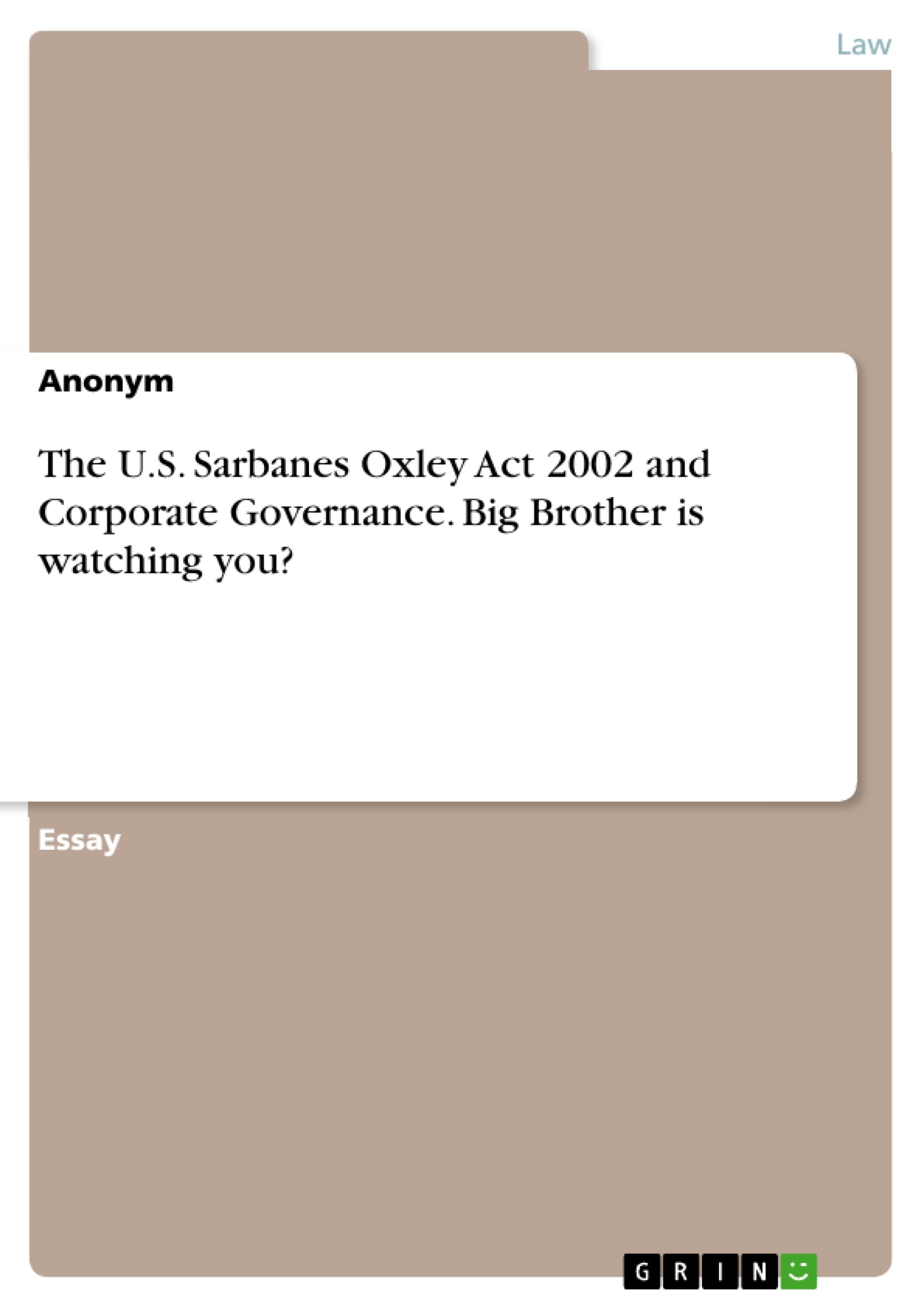Corporate Governance has become one of the hottest fields of international company law and economics. Whereas many European countries have chosen self – regulatory market based approaches or favour “comply or explain” provisions, the U.S. government decided to take mandatory legislative actions in the aftermath of various accounting and corporate governance scandals, headed up by Enron and WorldCom. This article explains why most, if not all of the relevant provisions regarding corporate governance, are ill conceived and thus should be withdrawn the sooner the better to prevent future economic harm. The author concludes with an evaluation and an outlook for alternatives.
Inhaltsverzeichnis (Table of Contents)
- Abstract
- A. Introduction
- B. Incidents which lead to the enactment of SOX
- C. SOX Corporate Governance Provisions
- I. "Inside" disclosure and monitoring provisions
- II. "Outside" disclosure and monitoring provisions
- III. Governmental co-operation and regulation
- D. Conclusion
- E. References
Zielsetzung und Themenschwerpunkte (Objectives and Key Themes)
This article examines the Sarbanes-Oxley Act of 2002 (SOX) and its impact on corporate governance in the United States. It explores the reasons behind SOX's enactment, focusing on the accounting scandals of the early 2000s, and analyzes the Act's provisions, particularly those related to disclosure and monitoring. The article argues that SOX, while intended to enhance corporate governance and protect investors, has several shortcomings and may even be detrimental to the economy. It also discusses the potential for alternative approaches.
- The evolution of corporate governance in the United States.
- The impact of the Sarbanes-Oxley Act on corporate governance.
- The effectiveness and potential drawbacks of SOX's provisions.
- The role of the federal government in regulating corporate governance.
- Alternatives to the SOX approach.
Zusammenfassung der Kapitel (Chapter Summaries)
The introduction presents the background and context for SOX, highlighting the shift from market-based regulation to government intervention in corporate governance. It also introduces the rationale behind the Act, emphasizing its focus on investor protection. The second chapter delves into the events leading up to SOX's enactment, focusing on prominent accounting scandals such as Enron and WorldCom. It examines the factors contributing to these scandals, including corporate culture, incentives, and regulatory failures. The third chapter analyzes specific provisions of SOX related to disclosure and monitoring, exploring both "inside" and "outside" control mechanisms. The article focuses on key aspects such as the requirement for independent audit committees, restrictions on non-audit services provided by auditors, and the certification of financial statements.
Schlüsselwörter (Keywords)
Corporate Governance, Sarbanes-Oxley Act 2002, accounting scandals, investor protection, disclosure, monitoring, federal regulation, self-regulation, market-based governance.
Frequently Asked Questions
What is the Sarbanes-Oxley Act (SOX)?
SOX is a U.S. federal law enacted in 2002 to improve corporate governance and financial disclosure in response to major accounting scandals like Enron and WorldCom.
Why was SOX enacted?
It was a reaction to corporate fraud and accounting failures that led to massive investor losses, aiming to restore public trust in the financial markets.
What are the key provisions of SOX?
Key provisions include the requirement for independent audit committees, CEO/CFO certification of financial reports, and strict internal control assessments (Section 404).
What is the main criticism of SOX?
Critics argue that the Act is overly burdensome, increases compliance costs significantly, and may stifle economic growth by discouraging companies from going public.
Does SOX affect non-U.S. companies?
Yes, any company listed on a U.S. stock exchange, regardless of its country of origin, must comply with certain provisions of the Sarbanes-Oxley Act.
- Citar trabajo
- Anonym (Autor), 2005, The U.S. Sarbanes Oxley Act 2002 and Corporate Governance. Big Brother is watching you?, Múnich, GRIN Verlag, https://www.grin.com/document/52693



